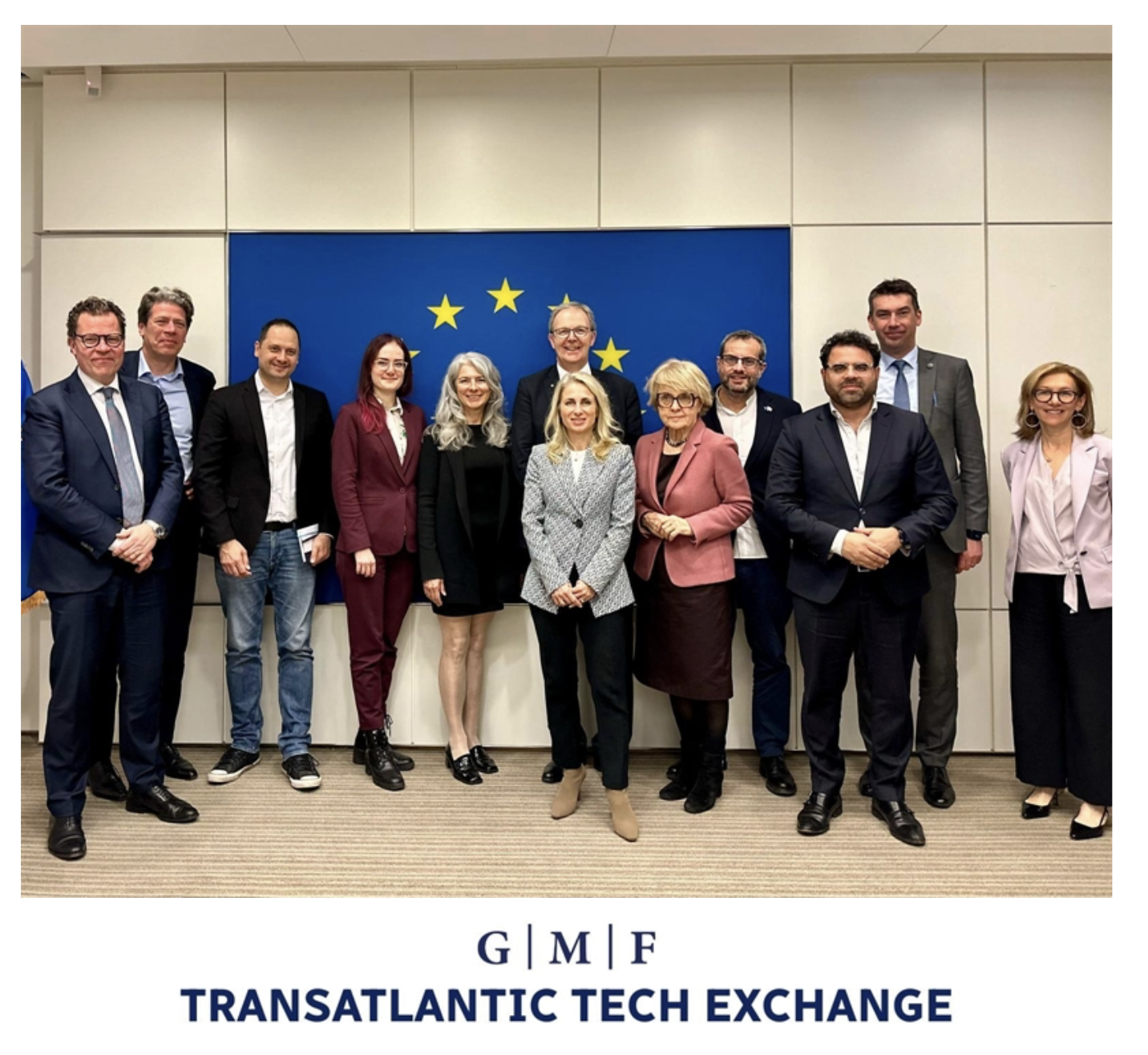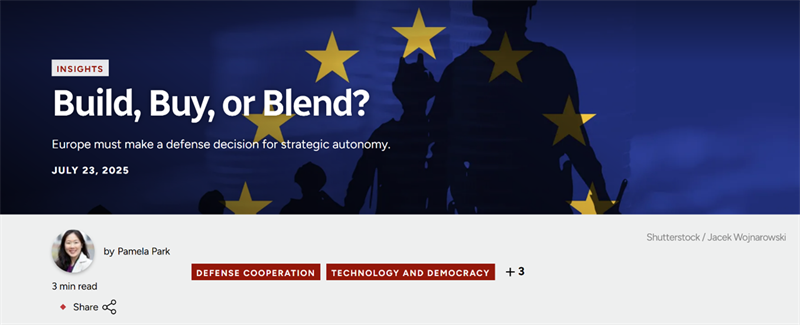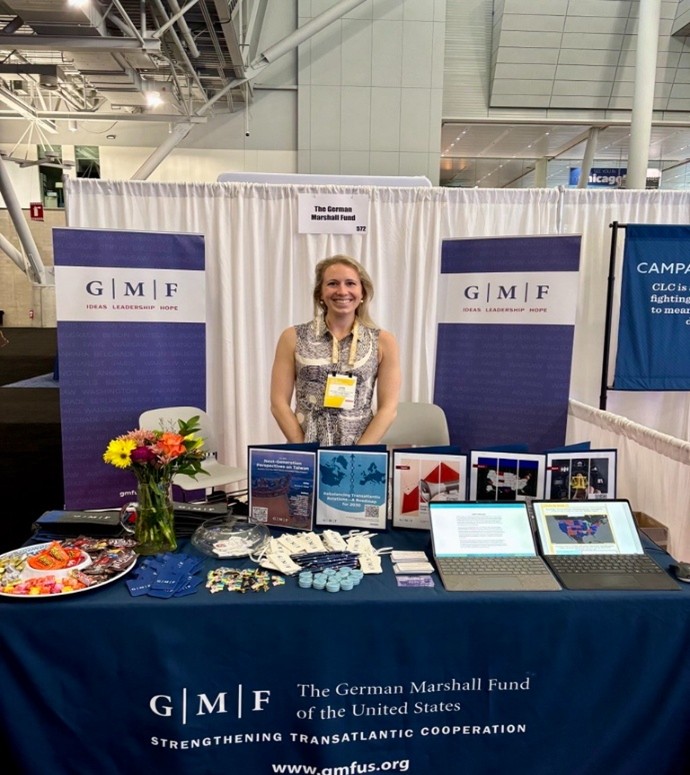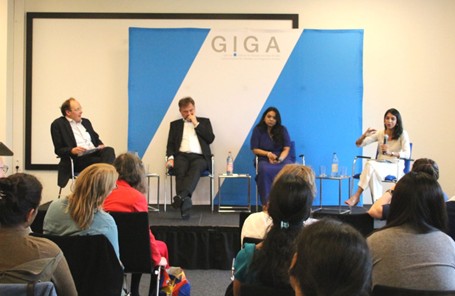TransatlanTech Insider—August 2025 Edition
Welcome to the August edition of the TransatlanTech Insider.
Industrial policy in Washington is taking on a new, tech-and-foreign-policy flavor, as the US government gets involved in the semiconductor industry. This month, chipmakers Nvidia and Advanced Micro Devices (AMD) were granted export licenses to sell their H20 and MI308 AI chips to China in exchange for a 15% commission on the revenue. The unusual deals send a somber message that US national security goals—in this case, maintaining a lead over China in the frontier AI models these chips power—are for sale. That the US government is now financially entangled in these exports further misaligns economic and national security interests. At the same time, the US administration is in talks with Intel about a potential 10% stake in the company, after President Donald Trump publicly called for CEO Lip-Bu Tan’s resignation on account of China's business dealings.
The new US-EU trade agreement resolves to align approaches on economic security to enhance innovation, including cooperating on export controls as well as inbound and outbound investment screening. The joint statement kicked the can down the road on US concerns over signature EU digital legislation, the Digital Services Act and the Digital Markets Act, stating that the two parties would “commit to address unjustified digital trade barriers”. Europe also intends to purchase at least $40 billion in US-made AI chips.
Subscribe to receive future newsletter editions, follow us on X, and visit our webpage to learn more.
Featured This Month

This summer, GMF Technology launched the second edition of the Transatlantic Tech Exchange (TTX), a signature initiative convened with support from Stiftung Mercator and the Project Liberty Institute. TTX’s goals are to build trust and mutual understanding among European and US lawmakers at the federal and state levels; identify shared priorities; educate lawmakers on transatlantic technology policy and innovation environments; and provide policy analysis and recommendations to advance innovation and democratic values.
A study tour in late 2025 will bring a delegation of US state legislators to Brussels and Paris to engage with policymakers and innovators on public interest AI and data. A second study tour in the spring of 2026 will bring a delegation of members of the European Parliament focused on policies targeting the “AI value chain” to Washington, DC, and Boston, Massachusetts.
Visiting Senior Fellow Pamela Park Suggests New Framework for European Defense Leaders

In her new piece, “Build, Buy, or Blend?”, Park explores Europe’s options for defense modernization in the face of mounting Russian aggression and shifting US priorities. Drawing on Silicon Valley’s “Build-Buy-Blend" framework, she charts three paths for the continent: build an independent defense technology sector, buy proven US products, or blend outside systems with homegrown critical technologies.
GMF Technology Attends National Conference of State Legislatures’ Legislative Summit

Program Manager and Fellow Julia Tréhu represented GMF at the National Conference of State Legislatures (NCSL)’s Legislative Summit in Boston, Massachusetts, on August 4-6 alongside GMF’s Government Relations and Alliance for Securing Democracy programs. The conference featured sessions on AI’s risks and rewards, its implications for the power grid, and the impact of federal AI action on states. Tréhu and Senior Program Coordinator Adrienne Goldstein also met with prospective Transatlantic Tech Exchange stakeholders, including those from the Massachusetts AI Hub, the AI venture studio C10 Labs, and the MIT Media Lab.
Explore Legislative Summit Sessions
Senior Officer Sharinee Jagtiani Speaks at India Week Hamburg

Senior Officer Sharinee Jagtiani spoke at India Week Hamburg (IWH) on the panel “Many Friends, Few Responsibilities? India’s Sweet Spot in Global Geopolitics”. She joined German Ambassador to India Philipp Ackermann and regional experts from the German Institute for Global and Area Studies to explore India’s evolving relationship with Germany and the European Union. Jagtiani underscored the strategic opportunity in India’s positioning as a trusted technology partner for Europe, particularly in critical and emerging technologies.
Media Mentions
Byte-Sized Bulletin
AI and Democracy
- The European Commission delayed its investigation into Elon Musk’s X for alleged violation of Digital Services Act transparency rules. The decision coincides with trade negotiations between the EU and the United States.
- OpenAI released GPT-5, its most advanced AI model to date, with promises of fewer factual errors, enhanced coding abilities, and automatic adaptation to user needs. Public backlash over the model’s “emotionally distant” responses led CEO Sam Altman to keep the previous GPT model running for paid users.
- A federal judge struck down California’s Defending Democracy from Deepfake Deception Act of 2024, which restricts deepfake content around elections, citing a violation of Section 230 of the Communications Decency Act. The decision marks a victory for Elon Musk’s X, which challenged the law.
- China called for the creation of a global AI cooperation organization at the state-organized World AI Conference in Shanghai, days after the United States unveiled its AI Action Plan. Beijing emphasized the need for a global framework on AI governance and suggested that export controls on advanced semiconductors contribute to a “technological monopoly”.
- The US government will receive 15% of the revenue from Nvidia’s H20 and AMD’s MI308 chip sales to China as part of an arrangement for the companies to obtain export licenses from the Commerce Department.
- China is enlisting domestic AI firms to conduct sophisticated influence operations. Vanderbilt University researchers found that the Chinese AI company GoLaxy is building data profiles on US political figures.
- Big tech companies are split over a directive to sign the EU’s General Purpose AI Code of Practice. Google, Anthropic, and OpenAI agreed to follow the code, but Meta refused, claiming full compliance would stifle its competitiveness in the global AI race.
- The UK Online Safety Act’s age verification requirements took effect in mid-July. The Act’s provisions have empowered the British government to enforce the age verification laws beyond its borders, prompting the Office of Communications to order speech audits from several websites that are based outside the country.
- The US Department of State instructed its top diplomats to raise concerns about the EU’s Digital Services Act with European officials and push for its repeal or amendment.
The Download
- Julia Tréhu attended Project Liberty’s “State Leadership Summit on Digital Choice and the Future of Social Media” in Boston, Massachusetts, on August 6-7.
- Lindsay Gorman spoke at The Arms Control Negotiation Academy’s (ACONA) August Boot Camp on the panel “A snapshot of the future: How artificial intelligence and new technologies are changing risks to international security.”
- GMF Technology welcomed three summer trainees and interns: Livia Hartmann and Stephen Silvestri in the Berlin office and Dara Goldfein in the Washington, DC office.
- Alexandra Pugh joined GMF Technology as a program coordinator on August 11.
GMF Technology is dedicated to ensuring that democracies together win the strategic technology competition with autocrats.
Adrienne Goldstein, Alexandra Pugh, Dara Goldfein, and Stephen Silvestri coordinated this month’s TransatlanTech Insider.


